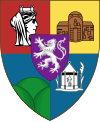Portal:European Union
Introduction
The European Union (EU) is a supranational political and economic union of 27 member states that are located primarily in Europe. The Union has a total area of 4,233,255 km2 (1,634,469 sq mi) and an estimated total population of over 449 million. The EU has often been described as a sui generis political entity combining the characteristics of both a federation and a confederation. Containing 5.8% of the world population in 2020, EU member states generated a nominal gross domestic product (GDP) of around US$16.6 trillion in 2022, constituting approximately one sixth of global nominal GDP. Additionally, all EU states except Bulgaria have a very high Human Development Index according to the United Nations Development Programme. Its cornerstone, the Customs Union, paved the way to establishing an internal single market based on standardised legal framework and legislation that applies in all member states in those matters, and only those matters, where the states have agreed to act as one. EU policies aim to ensure the free movement of people, goods, services and capital within the internal market; enact legislation in justice and home affairs; and maintain common policies on trade, agriculture, fisheries and regional development. Passport controls have been abolished for travel within the Schengen Area. The eurozone is a group composed of the 20 EU member states that have fully implemented the economic and monetary union and use the euro currency. Through the Common Foreign and Security Policy, the union has developed a role in external relations and defence. It maintains permanent diplomatic missions throughout the world and represents itself at the United Nations, the World Trade Organization, the G7 and the G20. Due to its global influence, the European Union has been described by some scholars as an emerging superpower. In 2012, the EU was awarded the Nobel Peace Prize. The United Kingdom became the only member state to leave the EU, in 2020; ten countries are aspiring or negotiating to join it. (Full article...) Selected article The Galileo positioning system is a proposed satellite navigation system, to be built by the European Union as an alternative to GPS (which is controlled by the United States military) and the Russian GLONASS. The system should be operational by 2010, two years later than originally anticipated. The first stage of the Galileo program was agreed upon officially on May 26, 2003 by the European Union and the European Space Agency (ESA). It is named after the Italian astronomer Galileo Galilei. The Galileo positioning system should not be referred to as GPS, which refers specifically to the existing United States system, but as "Galileo." Galileo is intended to provide: greater precision to all users, improved coverage of satellite signals at higher latitudes, which northern regions such as Scandinavia will benefit from, a positioning system upon which European nations can rely even in times of war or political disagreement. Selected picturePainting: Claude Monet The Garden at Sainte-Adresse is an oil-on-canvas painting by the French impressionist painter, Claude Monet. It was painted in 1867 in the French resort town of Sainte-Adresse, where Monet was spending the summer. The models were probably Monet's father Adolphe, his cousin Jeanne Marguerite Lecadre, her father Adolphe Lecadre, and perhaps Lecadre's other daughter, Sophie, the woman seated with her back to the viewer. The painting is composed with flat horizontal bands of colour, which were reminiscent of Japanese colour wood-block prints. The Garden at Sainte-Adresse is now in the Metropolitan Museum of Art in New York City.
Did you know?...that France possesses the largest exclusive economic zone (EEZ) in the world? ...that Monaco, San Marino, and Vatican City all mint their own euro coins, with their own national symbols on the back? ...that Turkey's two most famous weightlifters, Naim Suleymanoglu and Halil Mutlu are only two of four weightlifters in the world to have won 3 gold medals in 3 olympics? Selected citySofia is the capital and largest city of the Republic of Bulgaria, with a population of 1,246,791, and some 1,377,761 in the metropolitan area, the Capital Municipality. It is located in western Bulgaria, at the foot of the mountain massif Vitosha, and is the administrative, cultural, and economic centre of the country. The history of Sofia dates back to the 8th century B.C, when Thracians established a settlement there. Sofia has had several names in the different periods of its existence, and remnants of the city's millenary history can still be seen today alongside modern landmarks. Sofia is one of the oldest capital cities in Europe, blending its past and present in a remarkable architectural style. Historic landmarks include the 10th-century Boyana Church, the Alexander Nevski Cathedral, and the early Byzantine Saint Sofia Church. More modern architecture is represented by the Bulgarian National Opera and Ballet, the Ivan Vazov National Theatre, the Rakovski Str theatre district, Slaveykov Square's outdoor book market, and the NDK. Sofia is the see of an Eastern Orthodox and of a Roman Catholic diocese. General imagesThe following are images from various European Union-related articles on Wikipedia.
TopicsFeatured contentFeatured articles
Featured lists
Featured contentGood articles
CategoriesRelated portalsAssociated WikimediaThe following Wikimedia Foundation sister projects provide more on this subject:
Discover Wikipedia using portals |
































































